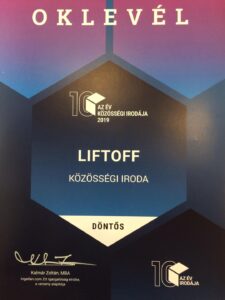The fact that the industry would be shut down for a whole year was unforeseeable. -says Balázs Varga, founder of Tixa, one of Hungary's most successful online ticketing systems, who restructured his company in Liftoff.
A Tixa his team escaped the storm of Covid to the Liftoff to get through this difficult period. True, we didn't meet under the most ideal circumstances, but we are very happy to be able to provide a supportive backdrop for such a professional team to get through this difficult time. We asked Balazs Varga, founder of Tixa, about his success story and his experiences of getting through the difficult period.
(Photo: Dániel Németh)
- How did the Tixa story start?
 I founded Tixa at the end of 2013 and the website was launched in spring 2014, so we've now been running for almost 7 years. My background goes back even further, I started my career as a concert promoter in 1997, and alongside that I also became interested in the graphic approach to how different theatre and concert tickets are made. So, in addition to organising, I started producing my own tickets for various theatre festivals and then expanded to include music. Eventually I was hired by a ticketing company to help them expand their market in Hungary. When I left that company, I decided that I wanted to go my own way, not
I founded Tixa at the end of 2013 and the website was launched in spring 2014, so we've now been running for almost 7 years. My background goes back even further, I started my career as a concert promoter in 1997, and alongside that I also became interested in the graphic approach to how different theatre and concert tickets are made. So, in addition to organising, I started producing my own tickets for various theatre festivals and then expanded to include music. Eventually I was hired by a ticketing company to help them expand their market in Hungary. When I left that company, I decided that I wanted to go my own way, not
work as an employee. It took me about 4 years to develop the final operational concept for a self-run ticketing company. After the start-up, as the number of partners increased, so did the number of team members, which grew to 11 at peak times
- How is Tixa different from other online ticketing companies?
We have taken a different approach to the distribution of tickets from their inception, which thanks in large part to my background as an organiser. I was more aware of their to set up the basic principles for the operation of the Tixa system. The other is that I have had the opportunity to test a lot of systems abroad, mainly in the English and Scottish areas. I have seen the need for a big generational change in the ticketing market in this country, traditional ticket agencies are very expensive for concert promoters and running an office is very expensive. I was only thinking about an online solution with a lot of new features that were not available in the market at that time in this country, for example, that the ticket receipts should go directly to the organiser, not to the sales agent, so that the invoicing can go on behalf of the organiser. Thanks to these functions, the Valley of Arts and Dürer Kert trusted us right from the start, and they proved to be very good initial partners, because soon afterwards we signed a contract with Budapest Park, and even after that we never had to worry about how to lure partners, but we grew organically thanks to the satisfaction of our partners. Many were on the verge of going digital and we were able to provide a solution for both paper and online ticketing. We also helped organisers to set up their own online systems. We entered the market at a very good time and over the years we now have over 1000 partners. Our main focus now is on how to keep them, how to serve their needs.
- How has COVID changed the way you work, the way the company operates in the last year?
Dramatic. We had never had a scenario like that before, you couldn't plan for it even if you had emergency capital in the company. You couldn't plan for the whole industry to shut down for a whole year. Basically, we were aware of all the regulations, we complied with everything that was required, but the whole industry and we were unprepared for the pandemic. There were cancellations before, we had to refund tickets for entire events, but in the spring, within a few weeks, about 1000 events were cancelled. Normally there are 5000 events a year on the site and only a few of those are cancelled in their entirety. And it happened in the spring, when the season kicks in, when there are a lot of events. Even the OTP's Simple Pay system could not handle the situation, it took several weeks before the financial systems could come up with a method for reimbursement that we could start to develop.
Compared to the first cancellation, it only took a month to technically allow for a mass refund. The whole year was very extreme because there were constantly new problems to solve, when there was an opportunity to hold small events everyone was quick to take advantage of it, regulations were constantly changing and you had to keep an eye on the rules. Our main concern was to try to get through the period without having to lay anyone off, so we gave notice to our old office and cut marketing costs and hoped for public assistance. In comparison, our business was not even included in the first wage subsidy provision, even though our turnover dropped to 3-4% in the spring, and we were only included at the beginning of the summer after many amendments. Unfortunately, when it became clear that there would be a second wave, I had to let one person go.
- Culture has moved online. Does this affect you?
We can now serve those who have their own solution for streaming itself, which means about 10% of traffic compared to normal. We do have some pre-sales for next year's events, but it's noticeable that people are not planning that far ahead. For sure, for the future, most people will get used to socializing less and less. I would definitely support a stream ticket option for theatres and concerts when life returns to normal. Another positive thing that I saw in the first month was that people's support increased, they saw that culture was in trouble and they wanted to help.
From the very first moment, we felt that, especially for music concerts and festivals, or performances by independent theatre companies, the the public wants to actively help. Firstly, by not charging back the price of their tickets, and secondly, through campaigns where they can donate their money for culture and entertainment to support those who value their activities. This momentum has been sustained for a long time, driven primarily by the shock effect. And there was no shortage of shock effects as the government delayed emergency cultural funding. This situation may have been a bit of a catalyst for community funding in these arenas, but the culture of it is not built overnight. In the meantime, perhaps the important thing is to communicate openly and honestly with the public, with the consumers of culture, and not to forget that they are also curious about the situation and the vision of the creators, organisers and contributors.
- What developments are you focusing on now because of COVID?
We have a new product, a webshop that can be integrated into an orchestra website. We're going to start right away with very good orchestras like 30Y, we're going to launch that now. This will also help the bands to generate some income from the merchandise they sell while there are no concerts. In the future we would like to expand this to even help with logistics where there is a need. We also want to develop the streaming part and cashless has been very important for us for a couple of years now, and Covid has brought that to the fore even more. We've developed a solution where the user can top up their wristband with credit themselves and not have to queue at the festival to top up.
- You work mostly from home now, how does the home office affect the team? The dynamics are slowly but surely going downwards - that is clearly visible. Everyone was a bit happy about it at the beginning, but we were quite flexible before. In fact, we wanted to organise our office life a bit. It's important to have a place to go to, to be able to meet, and it's good to work individually, but there are also small group tasks that are more effective in an airspace than online. It's really good to have a flexible office solution in Liftoff, to have space for small group work and individual work and whole team meetings. The other big attraction of Liftoff was that there are cultural businesses and associations here. I think it's very good that these companies can find each other, it's important to have this kind of base, which promotes cooperation in the cultural and creative scene.




